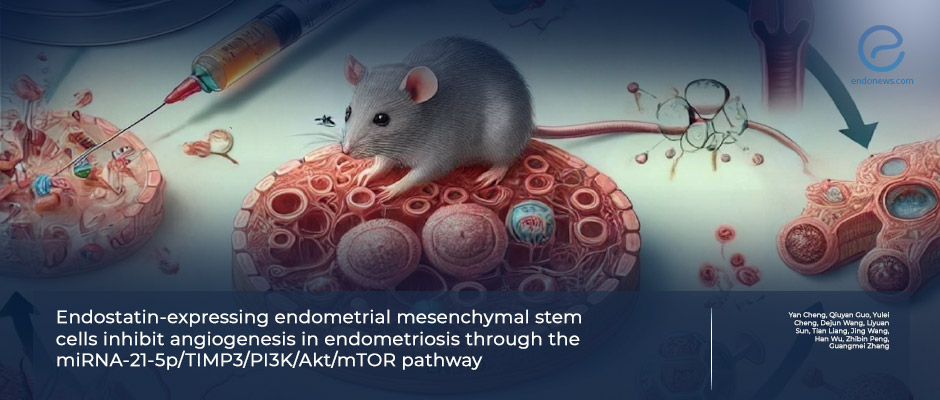Endostatin-Expressing Stem Cells: A New Approach to Treating Endometriosis
Jan 15, 2025
Targeted Gene Therapy May Show Promise in Halting Endometriosis Progression
Key Points
Highlight:
- Endometrial mesenchymal stem cells engineered to express endostatin (EMSCs-Endo) effectively reduce blood vessel growth (angiogenesis) and suppress endometrioticlesion growth.
- The therapy works by altering the miRNA-21-5p/TIMP3/PI3K/Akt/mTOR signaling pathway, reducing inflammation and disease progression.
Importance:
- In a mouse model of endometriosis, EMSCs-Endo effectively targeted lesions and suppressed disease progression.
- These results underscore its potential as a safe, innovative gene therapy for endometriosis, paving the way for future clinical applications.
What’s done here?
- Endometrial mesenchymal stem cells were isolated, characterized, and genetically modified to express endostatin (EMSCs-Endo), then used in vitro and in vivo experiments to evaluate their effects on angiogenesis, proliferation, and apoptosis in endometriosis models.
- Cellular and molecular analyses were performed to assess the impact of EMSCs-Endo on endometriotic lesion progression and associated pathways.
Key results
- EMSCs-Endo reduced the proliferation, migration, and angiogenesis of human umbilical vein endothelial cells in vitro.
- In mouse models, EMSCs-Endo decreased lesion size and vascular density by downregulating the miRNA-21-5p/TIMP3/PI3K/Akt/mTOR pathway.
- EMSCs-Endo demonstrated a favorable safety profile, with no tumor formation observed, underscoring their potential as a safe and effective targeted therapy of endometriosis.
Limitations
- After constructing EMSCs-Endo, researchers need to conduct more comprehensive research on their characteristics, such as gene expression profiling sequencing and cell proliferation, migration, and invasion assays, among others.
- In the in vivo toxicity experiments involving EMSCs-Endo, researchers analyzed the tumorigenicity of EMSCs, EMSCs-Endo, and EMSCs-GFP. Since infertility is one of the main symptoms of endometriosis, the formation of endometrial stromal vessels not only affects the pathogenesis of endometriosis but also impacts patient fertility and further studies needed for the fertility potential.
Lay Summary
Endometriosis is a chronic inflammatory condition characterized by abnormal blood vessel formation.
Endostatin, a potent angiogenesis inhibitor, has shown potential in targeting the process of angiogenesis.
In a study published in Stem Cells Translational Medicine, Peng and Zhang et al. explored the therapeutic potential of genetically engineered endometrial mesenchymal stem cells (EMSCs-Endo) designed to express endostatin.
The study revealed that EMSCs-Endo effectively homed to endometriotic lesions and locally released endostatin, resulting in a significant reduction in blood vessel formation and endometriotic lesion size in animal models. These effects were mediated by downregulating the miRNA-21-5p/TIMP3/PI3K/Akt/mTOR pathway, a critical driver of angiogenesis, alongside an increase in TIMP3 expression.
In vitro experiments demonstrated that EMSCs-Endo inhibited cell proliferation, migration, and angiogenesis in endothelial cells. Importantly, the cells exhibited a favorable safety profile in mice, with no evidence of tumor formation or adverse effects.
This novel approach leverages the natural homing ability of stem cells to deliver a targeted anti-angiogenic protein, offering a promising alternative to current surgical and hormonal therapies, which often have significant side effects and limited long-term efficacy. Additionally, the identification of the miRNA-21-5p pathway provides new insights into the molecular mechanisms of endometriosis, paving the way for further research and clinical application.
Research Source: https://pubmed.ncbi.nlm.nih.gov/39589222/
mesenchymal stem cells endostatins endometriosis angiogenesis gene therapy

